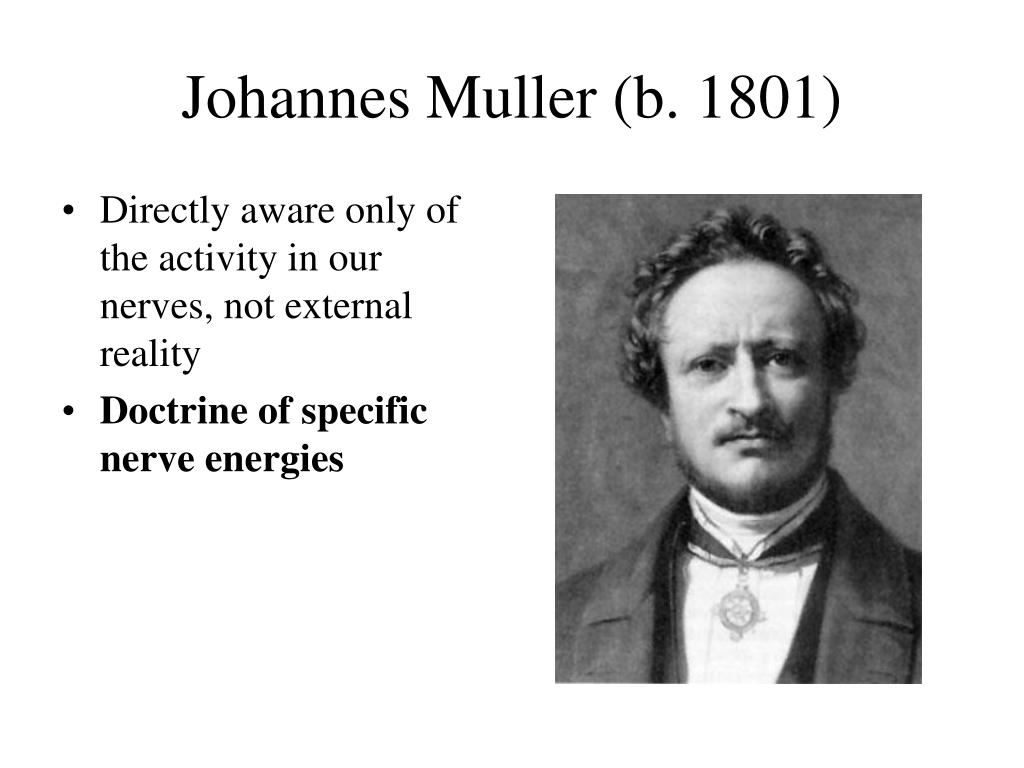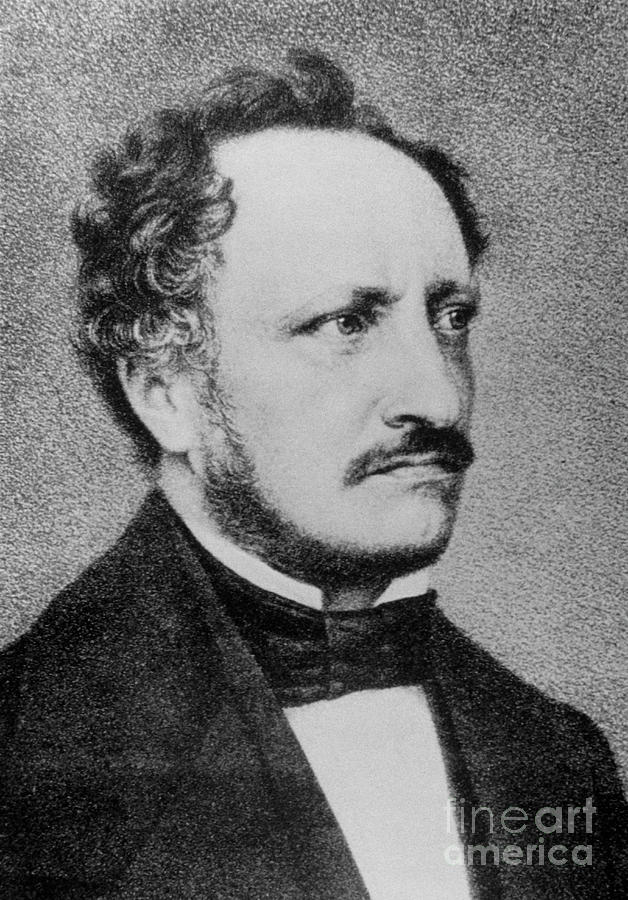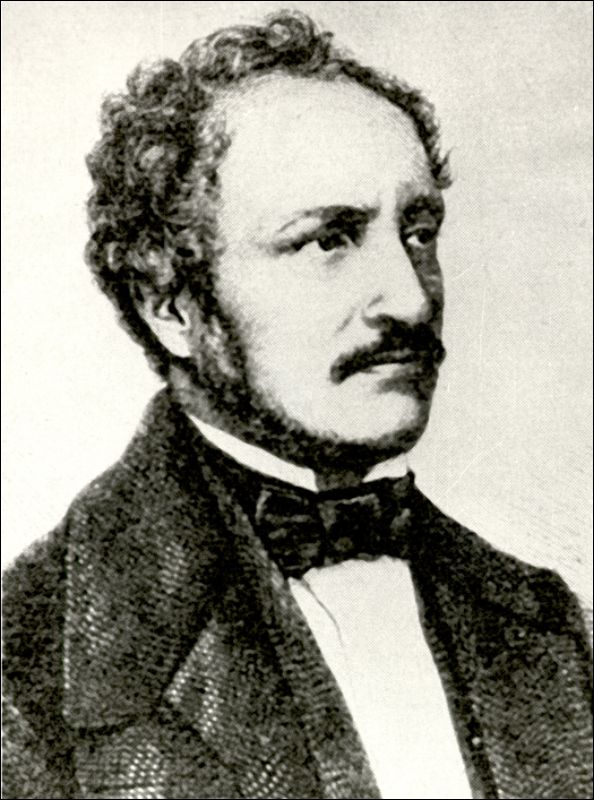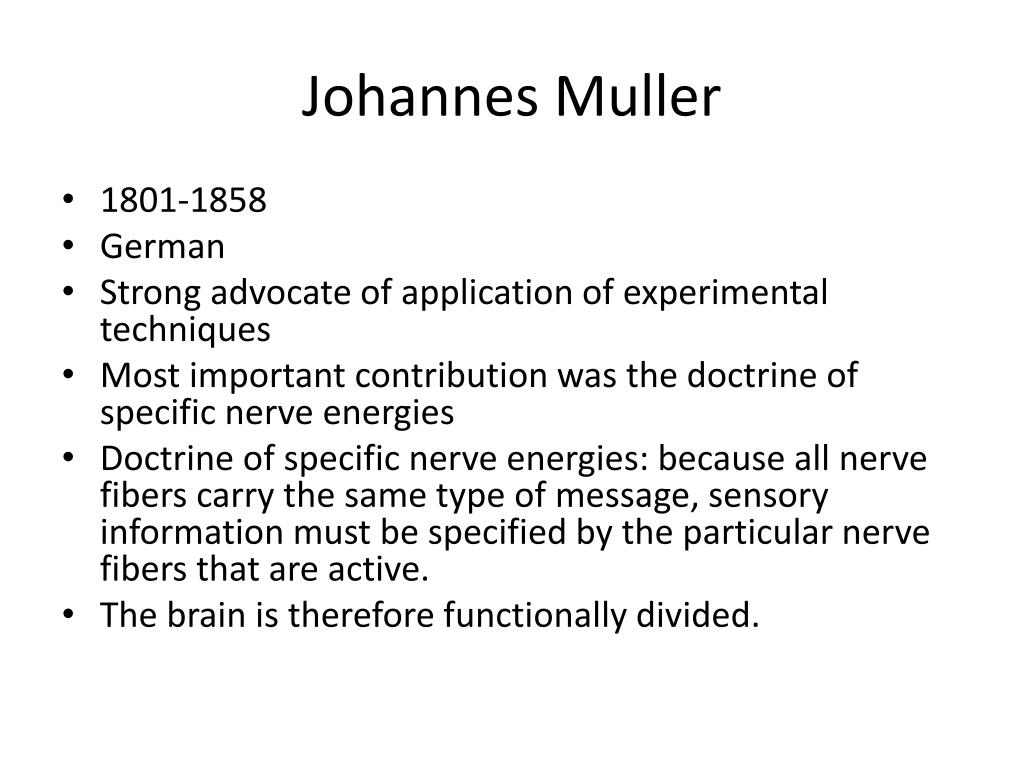
Johannes muller Fotos e Imágenes de stock Alamy
The great nineteenth-century physiologist Johannes Müller (1801-58) made important contributions in a range of subjects but especially in the study of the nervous system and in the psychology and physiology of perception.

PHYSIOLOGICAL PSYCHOLOGY CHAPTER 6!!! Johannes Muller Described the
ABSTRACT: Johannes Muller's law of specific nerve energies (LOSNE) states that the. mind has access not to objects in the world but only to our nerves. This law implies that the contents of the mind have no qualities in common with environmental objects but serve. only as arbitrary signs or markers of those objects.

Johannes MÜLLER Universität Witten/Herdecke, Witten Department of
Johannes Muller (1801-1858) is frequently referred to as the father of experimental physiology. While it might be argued that the title belongs more properly to Sir Charles Bell, the fact remains that during the first half of the nineteenth century Muller was the dominant figure in the rapidly developing science of physiology.

PPT Development of Physiological Influences PowerPoint Presentation
Volume 7: Summer 2020. Volume 6: Spring 2019. Volume 5: Spring 2018. Volume 4: Spring 2017. Volume 3: Spring 2016. Volume 2: Spring 2015. Volume 1: Spring 2014. UCLA (University of California, Los Angeles) is the largest UC campus in terms of enrollment, and one of the few public research universities located in a major city.

History of Pain Management from Specificity to Pain
Johannes Peter Müller (14 July 1801 - 28 April 1858) was a German physiologist, comparative anatomist, ichthyologist, and herpetologist, known not only for his discoveries but also for his ability to synthesize knowledge. The paramesonephric duct (Müllerian duct) was named in his honor. Life Early years and education Müller was born in Coblenz.

The History of Psychology and It’s Development feluthfiati
Johannes Muller's law of specific nerve energies (LOSNE) states that the mind has access not to objects in the world but only to our nerves. This law implies that the contents of the mind have no qualities in common with environmental objects but serve only as arbitrary signs or markers of those objects. The present article traces the implications of LOSNE for non-physical theories of mind and.

Johannes Peter Muller Photograph by Science Photo Library Pixels
died on April 28, 1858 in Berlin. Among numer-ous outstanding achievements during his career, he published several books including the eight books between 1833 and 1840 that comprised his Handbuch der Physiologie des Menchen. The Handbuch established Müller as the most renowned physiologist of his time.

Biografie, Johannes Müller
Between 1828 and 1838 Johannes Muller (1801-1858) published his important neurophysiological and anatomical investigations (primary fibres, cranial nerves, reflex movement, experimental proof of Charles Bell's law). Muller's strategies and concepts in neurophysiology can be used as an example for his scientific approach.

Johannes Müller (Physiologe) AnthroWiki
Wundt and the Development of Psychology Wundt's and his teachers and mentors Note the important role of three German universities in the formation of psychology: Berlin, Heidelberg and Leipzig. Johannes Müller After he obtained his medical degree, in 1855, Wundt went to Berlin and studied with Johannes Müller for a year.

PHYSIOLOGICAL INFLUENCES ON PSYCHOLOGY CH 3 Lecture Prepared
Johannes Müller, (born July 14, 1801, Koblenz, France [of the Consulate]—died April 28, 1858, Berlin, Germany), German physiologist and comparative anatomist, one of the great natural philosophers of the 19th century. His major work was Handbuch der Physiologie des Menschen für Vorlesungen, 2 vol. (1834-40; Elements of Physiology ).

PPT Chapter 1 The science of psychology PowerPoint Presentation
Johannes Müller's law of specific nerve energies (LOSNE) states that the mind has access not to objects in the world but only to our nerves. This law implies that the contents of the mind have no qualities in common with environmental objects but serve only as arbitrary signs or markers of those objects.

PPT Philosophical Roots of Psychology PowerPoint Presentation, free
They cajole, or ridicule, or ostracise the problem-maker, or they might try to leave him on his own. Some aggressors might respond by backing down and trying to mend their ways. Others, however.

Meet Johannes Muller All that matters is TheAdReview
Overview Johannes Peter Müller (1801—1858) German anatomist and zoologist Quick Reference (1801-1858) German physiologist Müller, a shoemaker's son from Koblenz in Germany, graduated in medicine from the University of Bonn in 1822.

Johannes Müller (18011858), Profesor de Fisiología de las
PSYCHOLOGY * Philosophical analysis of psychological concepts has led to some im-portant criticisms of theories of behavior developed by experimental. Johannes MUller was still a vitalist, but by 1845 the progress of physiology made it possible for some of his students,, including DuBois Reymond,

Johannes Müller (Physiologe) AnthroWiki
2. Johannes Müller (1801-1858) About Johannes Müller (brief) More about Johannes Müller Major point, of TREMENDOUS IMPORTANCE for psychology: Your awareness is not the object out there, it is of your nervous system. The nervous system is an intermediary between the object and your consciousness.

PPT The 19 th century PowerPoint Presentation, free download ID1090043
Johannes Müller-Trede is Associate Professor of Managerial Decision Sciences. He holds a Ph.D. in Economics from Universitat Pompeu Fabra in Barcelona, and an MA (Mod) in Management Science and Information System Studies from Trinity College, Dublin. Before joining IESE, he spent several years as a post-doctoral researcher at UC San Diego's.